Bahrain mourners call for an end to monarchy
![]()
Mood of defiance against the entire ruling system after the brutal attack on Pearl Square protest camp that left at least five dead
Associated Press

“The regime has broken something inside of me … All of these people gathered today have had something broken in them,” said Ahmed Makki Abu Taki, whose 27-year-old brother Mahmoud was killed in the pre-dawn sweep through the protest camp in Manama’s Pearl Square. “We used to demand for the prime minister to step down, but now our demand is for the ruling family to get out.”
Outside a village mosque, several thousands mourners gathered to bury three men killed in the crackdown. The first body, covered in black velvet, was passed hand to hand toward a grave as it was being dug.
Amid the Shiite funeral rites, many chanted for the removal of King Hamad bin Isa Al Khalifa and the entire Sunni dynasty that has ruled for more than two centuries in Bahrain, the first nation in the Gulf to feel the pressure for changes sweeping the Arab world.
There were no security forces near the mosque on the island of Sitra, where three of those killed had lived.
The White House has expressed “strong displeasure” about the rising tensions in Bahrain, which is home to the US Navy’s 5th Fleet and the centerpiece of the Pentagon’s efforts to confront growing Iranian military ambitions in the region.
The capital and other areas remained under the close watch of the military and police – which includes various nationalities from around the region under a policy by Bahrain’s ruling system to give citizenship and jobs to other Sunnis to try to offset the Shias, who account for about 70% of the population.
Soldiers guarded the capital’s main areas and placed roadblocks and barbed wire around Pearl Square and other potential gathering sites. Work crews were busy trying to cover up the protest graffiti.
Bahrain’s leaders have banned public gatherings in an attempt to keep the protest movement from re-igniting. But the underlying tensions in Bahrain run even deeper than the rebellions for democracy that began two months ago in Tunisia and later swept away Hosni Mubarak in Egypt and is challenging old-guard regimes in Libya and Yemen.
In the government’s first public comment on the crackdown, Foreign Minister Khalid Al Khalifa said Thursday it was necessary because the demonstrators were “polarising the country” and pushing it to the “brink of the sectarian abyss.”
Speaking to reporters after an emergency meeting with his Gulf counterparts in Manama to discuss the unrest, he called the violence “regrettable,” said the deaths would be investigated and added that authorities chose to clear the square by force at 3 am – when the fewest number of people would be in the square – “to minimise any possibility of casualties.”
Many of the protesters were sleeping and said they received little warning of the assault. More than 230 people were injured, some seriously.
Related Articles
UN monitors arrive in Syria as fighting rages
![]()
City of Homs shelled as advance UN team of observers arrives in Damascus to reinforce Annan’s six-point peace plan The
Netanyahu Rejects Kerry’s Boycott Warning
![]()
???? ??? ????? ???????? by Naharnet  Israeli Prime Minister Benjamin Netanyahu on Sunday rejected remarks by U.S. Secretary of State John
Highlights of Assad’s speech
![]()
Syrian president blames unrest on saboteurs, pledges reformsHere are some of the highlights of his speech given at Damascus University.


